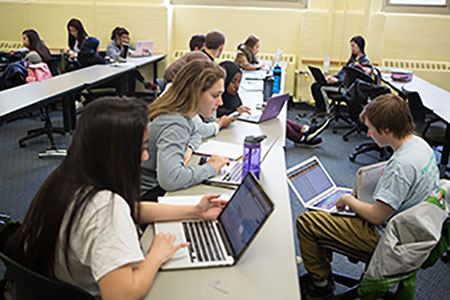First Year Experience (FYE)
The First Year Experience is a unique curriculum that all freshmen in CEHD are a part of, designed to build community and help you transition from high school into college. FYE’s rigorous and innovative curriculum includes two semesters: EDHD 1525W: CEHD First Year Experience course in the fall and high impact course options in the spring. FYE courses help you reach your four-year graduation goals, support the completion of U of M’s liberal education requirements, and meet prerequisites for the majors in CEHD. CEHD students in the President's Emerging Scholars program, including students selected for the TRIO Student Support Services program, participate in CEHD's first-year curriculum.
Highlights:
- Small group discussions, encouraging you to get to know your peers and instructors
- Curriculum focused on debating our most pressing social-justice issues
- Collaborative projects with peers
- Service learning and community engagement
- Faculty who research the best practices in teaching and learning

Did
you
know
40% of Fall 2023 first-year students are
first-generation students.
Fall semester
Spring semester
First Year Experience course
In the fall semester, you’ll enroll in the EDHD 1525W: CEHD First Year Experience, a discussion-based class with a seminar atmosphere focused on developing your reading, critical thinking, and academic writing skills.
The FYI course addresses the shared inquiry: “How can one person make a difference?” by discussing a common book. The Fall Semester 2023 book is Disability Visibility edited by Alice Wong, and you will examine the book through additional readings, writing, and discussion. Find out more on the CEHD Reads website.
Fall 2023 First Year Experience instructors
- Anthony Albecker
- Lori Ann Laster
- Daheia Barr-Anderson
- Colleen Clements
- Kirsten Collins
- Kayla Cory
- Irene Duranczyk
- Barbara Hodne
- Margaret Kelly
- Alex Klapperich
- Katie Krueger
- Anne Larson
- Laura Paczkowski
- Charisse Pickron
- Molly Rojas-Collins
- Abigail Rombalski
- Andrea Silva
- Amani Stumme-Berry
- Elise Toedt
- Zer Vang
- Ah Vang-Lo
- Jennifer Witt
During the spring semester, students have the opportunity to choose from high impact practice courses such as courses in common, learning communities, community engaged learning, study abroad, freshman seminars and more. High impact practice courses use teaching and learning strategies that support social and academic engagement, supporting students in building relationships and forming a community with faculty, staff, and students, while developing a sense of belonging in the college and on campus.